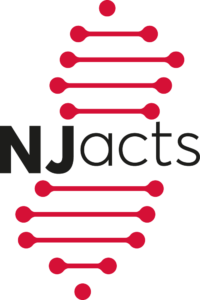
 The New Jersey Alliance for Clinical and Translational Science (NJ ACTS) Community Engagement Core is excited to announce the selection of 2 Partnership and Innovation Accelerator Pilot Grant Program (PIAP) and 3 Advancing Health Equity and Social Justice (AHESJ) grant awardees for 2020. PIAP grants are one-year competitive awards to facilitate collaborations between academic researchers from Rutgers University, Princeton University, and/or New Jersey Institute of Technology with community organizations so they can work together on health research that benefits our communities. AHESJ pilot grants will support efforts forcommunity-engaged scholarship to address racial inequities and advance health equity and social justice in NJ. The awarded projects appear below:
The New Jersey Alliance for Clinical and Translational Science (NJ ACTS) Community Engagement Core is excited to announce the selection of 2 Partnership and Innovation Accelerator Pilot Grant Program (PIAP) and 3 Advancing Health Equity and Social Justice (AHESJ) grant awardees for 2020. PIAP grants are one-year competitive awards to facilitate collaborations between academic researchers from Rutgers University, Princeton University, and/or New Jersey Institute of Technology with community organizations so they can work together on health research that benefits our communities. AHESJ pilot grants will support efforts forcommunity-engaged scholarship to address racial inequities and advance health equity and social justice in NJ. The awarded projects appear below:
An Academic-Community Partnership to Prevent Perinatal
Depression Among Low-income and Black Women
Principle Investigator: Slawa Rokicki, PhD, MS – Rutgers School of Public Health
Community Partner: Central Jersey Family Health Consortium, North Brunswick, NJ
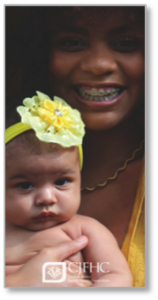 Perinatal depression is a major public health problem that disproportionately affects low-income women and Black women. Evidence shows that perinatal depression is preventable, yet social barriers and mental health stigma among low-income and Black women limit access to preventive care. We are seeking to build a partnership between Rutgers School of Public Health (SPH) and Central Jersey Family Health Consortium (CJFHC) with the goal of developing community-engaged approaches to addressing perinatal depression in central New Jersey communities. In this pilot study, we will facilitate collaboration through the development of an advisory committee and we will conduct an environmental scan to better understand the local context of perinatal depression among low-income and Black women. The ultimate impact is a reduction in racial and socioeconomic disparities in mental health services and decreased incidence of perinatal depression in central New Jersey communities.
Perinatal depression is a major public health problem that disproportionately affects low-income women and Black women. Evidence shows that perinatal depression is preventable, yet social barriers and mental health stigma among low-income and Black women limit access to preventive care. We are seeking to build a partnership between Rutgers School of Public Health (SPH) and Central Jersey Family Health Consortium (CJFHC) with the goal of developing community-engaged approaches to addressing perinatal depression in central New Jersey communities. In this pilot study, we will facilitate collaboration through the development of an advisory committee and we will conduct an environmental scan to better understand the local context of perinatal depression among low-income and Black women. The ultimate impact is a reduction in racial and socioeconomic disparities in mental health services and decreased incidence of perinatal depression in central New Jersey communities.
Partnership for Autism Awareness
Principle Investigator: Walter Zahorodny, PhD – NJMS
Community Partner: Statewide Parent Advocacy Network (SPAN), Newark, NJ
The key to early detection of Autism Spectrum Disorder (ASD), especially in underserved communities, is wide or universal use of a valid ASD screener during the toddler period. To improve the likelihood that children in the Newark region receive timely ASD screening, however, it is necessary to develop effective outreach strategies with community-based service organizations. The NJMS investigators will partner with the Statewide Parent Advocacy Network (SPAN) for a Newark based ASD screening intervention. SPAN will assist in convening and facilitating a Community Action Group of committed Newark stakeholders to engage in highlighting barriers and identifying and implementing Newark specific solutions to the identified problem. NJMS and SPAN investigators will conduct systematic outreach and fact-finding activities to promote awareness of ASD, identify barriers to ASD screening and take steps to enhance ASD screening of young children in the Newark region. The outcomes will  reduce disparities in the early detection of ASD experienced by underserved families, leading to earlier intervention and possibly enhanced functioning and capacity of young children with ASD.
reduce disparities in the early detection of ASD experienced by underserved families, leading to earlier intervention and possibly enhanced functioning and capacity of young children with ASD.
Identifying Needs, Barriers, and Facilitators in the Care and Rehabilitative Services for Hispanic Adults with Post-stroke Aphasia: Perspectives from Caregivers
Principal Investigator: Jose Centeno, PhD
Community Partner: RWJUH-CHPP and United Community Corporation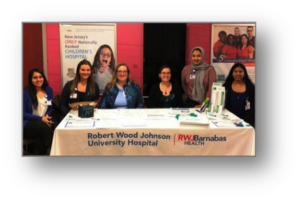
Demographic trends toward increased ethnoracial diversity in the aging population are expected to lead to increased representation of ethnoracially diverse groups in post-stroke rehabilitation. Ethno geriatric populations are at high risk of age-related cardiovascular complications. While stroke prevalence relative to Whites is higher among African Americans, followed by Hispanics and American Indian/Alaska Natives, Hispanic men are projected to have the greatest prevalence increase as the 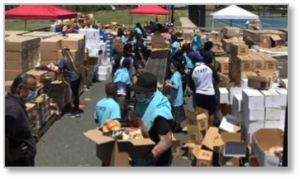 population ages. Aphasia, a frequent post-stroke communication disability, has biopsychosocial consequences for stroke survivors and caregivers. There are no community-participatory studies on post-stroke aphasia care in minority groups in the United States. In partnership with two NJ community organizations (RWJUH-CHPP and UCC), the proposed mixed methods action research study will set the initial foundation for establishing a sustainable community-university collaborative that simultaneously targets a community health priority and promotes health equity. The current research aims to gather preliminary evidence on the needs, barriers, and facilitators in post-stroke aphasia care of Hispanic adults from the perspective of their caregivers. This study will enable us to lay the foundation for a long-term multi-perspective research plan that will ultimately generate broad stakeholder-informed, culturally-tailored, evidence-based interventions for the growing under-resourced Hispanic aphasia groups in stroke care.
population ages. Aphasia, a frequent post-stroke communication disability, has biopsychosocial consequences for stroke survivors and caregivers. There are no community-participatory studies on post-stroke aphasia care in minority groups in the United States. In partnership with two NJ community organizations (RWJUH-CHPP and UCC), the proposed mixed methods action research study will set the initial foundation for establishing a sustainable community-university collaborative that simultaneously targets a community health priority and promotes health equity. The current research aims to gather preliminary evidence on the needs, barriers, and facilitators in post-stroke aphasia care of Hispanic adults from the perspective of their caregivers. This study will enable us to lay the foundation for a long-term multi-perspective research plan that will ultimately generate broad stakeholder-informed, culturally-tailored, evidence-based interventions for the growing under-resourced Hispanic aphasia groups in stroke care.
Project VOICE: Vaccination Outreach and Integrated Cardiovascular Risk Education in People Living with HIV
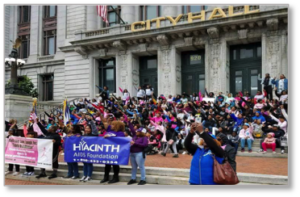 Principal Investigator: Christine Dimaculangan, PharmD
Principal Investigator: Christine Dimaculangan, PharmD
Community Partner: Hyacinth AIDS Foundation
People living with HIV (PLWH) also are embedded within socioeconomic status’ that represent social and economic inequity. HIV has impacted and continues to disproportionately impact minority patient populations (i.e. racial and ethnic minorities, men who identify as gay or bisexual). Many of the socioeconomic factors that are prevalent in PLWH do not solely affect their ability to control their HIV but can also lead to an increased risk for developing cardiovascular diseases (CVD). The aim of this community partnership is to expand and enhance the relationship between Ernest Mario School of Pharmacy at Rutgers University and the Hyacinth AIDS Foundation to bridge the gap of preventative health through education on CVD risk (i.e. increased risk of diabetes, hypertension, hyperlipidemia, etc.) and benefits of vaccines. Community programs will be created based on gaps identified within the community. Outreach programs will be facilitated by faculty members and students, with the goal of expanding this opportunity outside the school of pharmacy and incorporating students from other healthcare disciplines. This outreach program will serve and opportunity for students to be involved and will instill the principles and experiences of advancing health equity and social justice through active community participation.
Project Title: Equitable Recovery for the Esperanza Neighborhood:
A Responsive COVID-19 Training Program for Small Businesses and Nonprofits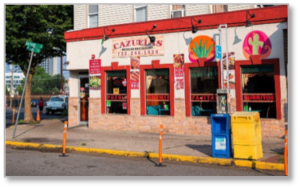
Principal Investigator: Richard Marlink, MD
Community Partner: New Brunswick Tomorrow
The COVID-19 pandemic has led to complex societal challenges and has resulted in considerable economic hardships for residents of New Brunswick accompanied by enormous stress. Rutgers Global Health Institute is committed to addressing these challenges and responding to the significant economic losses among small businesses and nonprofits. This project is focused on reducing these hardships and associated inequities by helping small businesses and nonprofits in New Brunswick with a special focus on the Esperanza neighborhood, where 38% of residents live below the poverty line. A majority of small businesses may not have the resources and support they need to re-open safely. By offering bilingual responsive trainings and virtual or on-site consultations at no cost, we can ensure that these small businesses and nonprofits (including faith-based organizations) are not left behind in the recovery process. We will empower these businesses and nonprofits with knowledge, tools, and guidance pertaining to a safe workplace.
The NJACTS initiative is the first NIH-funded program of its kind in New Jersey. It is part of a nationally supported network of more than 50 programs at medical research institutions that collaborate to speed the translation of research discoveries into improved patient care.
For questions about the Partnership and Innovation Accelerator Pilot Grant Program or the Advancing Health Equity and Social Justice Pilot Grant Program you may contact: njactscommunity@rwjms.rutgers.edu or visit us on the web at njacts.rbhs.rutgers.edu/community.
